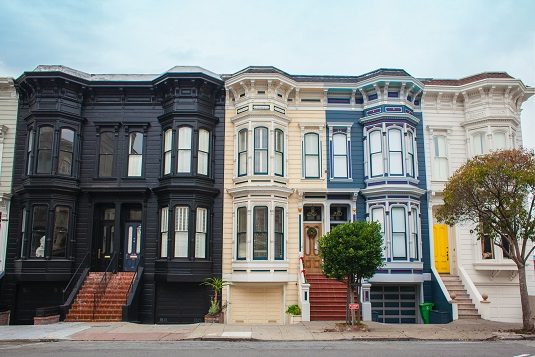
In the past year, we’ve witnessed a technological tidal wave. It’s possible that this surge could help create an even playing field for hopeful homeowners of all backgrounds. Has progress in fact sped up? The short answer seems to be no, not yet. Yet we’re seeing action, and some of it involves members of the real estate industry stepping up in the name of serious change.
For this article, we’ve examined some signals that 2021 could bring progress. Here’s what we’re watching.
Disparities Remain, Despite the Rise of Digital Home Buying.
Hoping to avoid racial profiling, some buyers do their retail shopping from the privacy of their computers. The rise of the digital home buying experience could be helpful to mortgage shoppers, too. At least in theory.
And then we have reality:
- It’s not about the online listing. The real-life location, apart from a home’s unique characteristics, affects how it’s appraised. Black-owned homes are regularly low-balled in appraisals.
- There’s also the matter of “digital redlining.” To confront it, the National Fair Housing Alliance, supported by the U.S. Department of Housing and Urban Development, filed suit (PDF) in 2020 to compel a brokerage to include all homes in its service areas, and to stop withholding key services, perks, discounts and access to refunds for houses under a specified minimum price.
- An MIT study found that Black borrowers continue to pay thousands of dollars more than other mortgage holders, and tens of thousands more in lifetime homeownership costs. This continues, even in our digital era.
Ideally, a digital market could make property transactions easier for everyone. For example, automated valuation software could provide a remedy for low-balled property valuations.
☛ Technology is changing the housing market. See more on the rise of the digital real estate industry here.
The Quest for Equal Access to Real Estate Backslides.
Black homeownership is still, proportionately, far lower than the overall U.S. homeownership rate. Disparity has been growing, despite real estate tech. Meanwhile, climate change continues to exacerbate the stress of households coping with related costs, such as higher utility bills and flood damage.
And now, since the advent of Covid-19, minority communities and working people face additional affordability challenges:
- While low mortgage interest rates have prompted a wave of buying and refinancing, many people are being left out.
- Mortgage companies have issued stricter criteria for loan approvals, making it harder to buy, or to draw on equity to get through the crisis.
- Black and Hispanic homeowners fell behind on mortgage payments during the pandemic at a higher rate than the overall averages.
The picture we paint here has far-reaching impacts. Home ownership enables people to build equity, so it’s a major form of wealth accumulation. According to the Urban Institute, this wealth-building effect is especially pronounced for Black households. When income is precarious, real estate is an important financial backup.
Past Disentitlement Shapes Current Realities.
Inequality in housing stems from the redlining and hurtful deed restrictions that shaped and limited communities over the past century. In 1948 the U.S. Supreme Court in Shelley v. Kraemer deemed racial deed restrictions unconstitutional. It took another 20 years for Congress, through the Fair Housing Act, to expressly prohibit housing discrimination based on national origin, race, religion, disability, gender or familial status.
But that was when redlining started. Title companies and banks, and government actors as well, wielded their power to deny applications and perpetuate segregation.
More recently, buyers experienced the housing bubble, which burst in 2008. In a vicious cycle, clusters of subprime loans, often followed by foreclosures, weighed on historically Black areas. Many Black households went back to renting. Rents went up. Those who could buy back into the market often got government-backed mortgages to do it. Their smaller down payments meant larger long-term debts.
What’s at Stake? Dignity for All People.

As noted above and as all Deeds.com readers know, 2020 was an especially challenging year. Springing into action to offset the financial dislocations of the pandemic, the U.S. Federal Reserve lowered interest rates. That move made sense, yet it also whipped up a “perfect storm” of low interest rates supercharging demand.
As the pandemic raged, home sales surged beyond expectations, rising 15% from 2019 to late 2020. Needless to say, those who kept their jobs and prepared for bidding wars have been winning the game. Meanwhile, millions of cash-strapped people face foreclosure and exclusion from the market.
Deeply entrenched disparities need highly dynamic remediation. What’s at stake is dignity for all people and the integrity of our society as a whole. One idea, proposed by Mehrsa Baradaran and cited by The Roosevelt Institute (PDF), would send federal injections of equity directly to people. Large-scale buyouts of abandoned properties and reconveyance to people who need homes would complement the stimulus.
Plans recommended by Alanna McCargo and Jung Hyun Choi at the Urban Institute include forgivable down payment grants or tax credits for home loans. Delegate Jazz Lewis of Maryland has urged states to offer vouchers to ensure access to “high-opportunity” residential areas that correlate with life-long financial strength.
Real Estate Agents Are Stepping Up, in Michigan and Everywhere.
The Fair Housing Center of Southeast and Mid Michigan (FHC) offers legal support for people facing discrimination. The Ann Arbor Area Board of Realtors® has just joined forces with the FHC, asking agents to support the 2021 Realtors® for Fair Housing Campaign.
Agents across the country are giving to the campaign, insisting that “our communities are no place for unfair treatment,” and signing a public commitment to equality in real estate practices. Readers can expect to see the finished statement in April 2021, in the Ann Arbor Observer.
The tone at the top matters. Accordingly, on November 19, 2020, Charlie Oppler, the new president of the National Association of Realtors®, published a formal apology for the association’s own past history of discrimination. NAR had engaged in systematic policy of residential racial segregation, resisted the enactment of the Fair Housing Act, and barred agents from its ranks on account of race and sex.
“We can’t go back to fix the mistakes of the past,” Oppler said. “But we can look at this problem squarely in the eye. And, on behalf of our industry, we can say that what Realtors® did was shameful, and we are sorry.”
The National Association of Realtors® has an impressive scope, with more than 1.4 million members, and can make a serious financial and social impact. It’s partnering with the Urban Institute National Association of Real Estate Brokers to do so. Visit NAR.realtor/fairhousing to explore the industry’s initiatives to overcome the effects of past race-based segregation, and to ensure integrated communities with amenities accessible to all.
Supporting References
Priya Elan, The Guardian: Racial Profiling Leads Minorities to Shop Online Rather Than in Stores (Jan. 18, 2021).
Jazz Lewis, Brookings Blog; How We Rise: States Can Pave the Way on Closing the Racial Wealth Gap (Oct. 9, 2020).
Alanna McCargo and Jung Hyun Choi, Closing the Gaps: Building Black Wealth Through Homeownership. Urban Institute Research Report (Nov. 2020; updated Dec. 2020).
Chris Herbert, Harvard University Joint Center for Housing Studies: Pandemic, Racial Injustice, and Climate Change Exacerbate America’s Housing Problems (Nov. 19, 2020).
Taylor Borden, Business Insider: The Racial Wealth Gap in Real Estate Is Growing (Nov. 14, 2020).
NAR Newsroom: NAR President Charlie Oppler Apologizes for Past Policies that Contributed to Racial Inequality (Nov. 19, 2020).
Photo credits: Larry Crayton and Bernadette Gatsby, via Unsplash.
